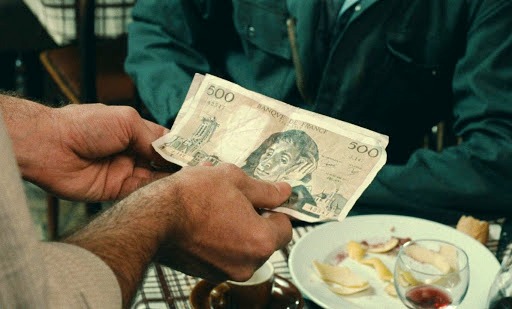 Robert Bresson’s 1983 film, his last, portrays the inexorable descent into inhumanity that begins with a simple dishonest act.
Robert Bresson’s 1983 film, his last, portrays the inexorable descent into inhumanity that begins with a simple dishonest act.
The great French director Robert Bresson directed his last film in 1983. It’s called L’Argent, which translates as “the gold” or “the money.” The story starts with a couple of schoolboys passing off a forged 500-franc note at a photography shop. Later the shop owner recognizes the forgery, but instead of taking the loss, allows the note to stay in the cash register, and it is eventually given as change by his assistant to a delivery man named Yvon (played by Christian Patey). When Yvon tries to use the note at a restaurant, he is accused of forgery, and takes the authorities to the shop, where the owner has bribed the assistant to say that he’s never seen Yvon before. The inexorable series of events continues until the consequences become deadly serious.
The film is based on a Tolstoy short story, but Bresson is not as interested in the tale’s simple moral about the escalating cost of dishonesty as he is in the larger theme of inhumanity as the way of life for modern man, or in fact as a mode of being and experiencing. The actions of the characters take place within the narrow scope of fear and self-interest, with no awareness of, or commitment to, the connections between people, so the suffering that results seems like the outcome of a process of mechanical necessity. To be able to show this fact, as Bresson does, rather than tell it, as almost any other director would try to do, is the mark of his austere genius.
As the stakes get higher, and the events involve more destructive crimes, the human response becomes less and less rational, yet still confined within a limited idea of self. We see Yvon, the victim, gradually change through the force of his anguish into a senseless perpetrator. The only way out he can find is to break through the chain of circumstances with some kind of redemptive act, even an insane and desperate one.
Bresson’s consistent method throughout his work—nonprofessional actors, the avoidance of psychology or dramatic expression, a relentless awareness of the physical—is arguably more effective here than in any of his other films. The careful, dispassionate observation lends ordinary scenes and objects an almost eternal significance. A sequence, for instance, where prison inmates discuss a man’s apparent suicide is both rigorously matter-of-fact in tone, and symbolic of the story’s entire narrative arc. The latter part of the film, involving an inscrutable woman who takes Yvon into her house, is something of a leap from the social concreteness of the film’s earlier sections into a kind of religious or allegorical realm of silence and dread.
Trying to explain Bresson’s films is difficult because most of the meaning is contained in what is not said, and in fact cannot be said, but only felt. This film is a tragedy that resists rational analysis. When we suffer, when we experience the suffering that we create ourselves from our own sense of separation, we must either learn to suffer for everyone—or for nothing.
L’Argent is available on DVD.

John Sayles holds a unique place in American film. For over three decades, he’s written and directed smart independent films on his own terms,...

English director Joanna Hogg presents the pain of a young woman filmmaker’s destructive relationship with an addict in The Souvenir, while Pamela B. Green’s...

A real case from the 1980s inspires this compelling thriller about a neo-Nazi group in Idaho, and the FBI agents that pursue them. With...